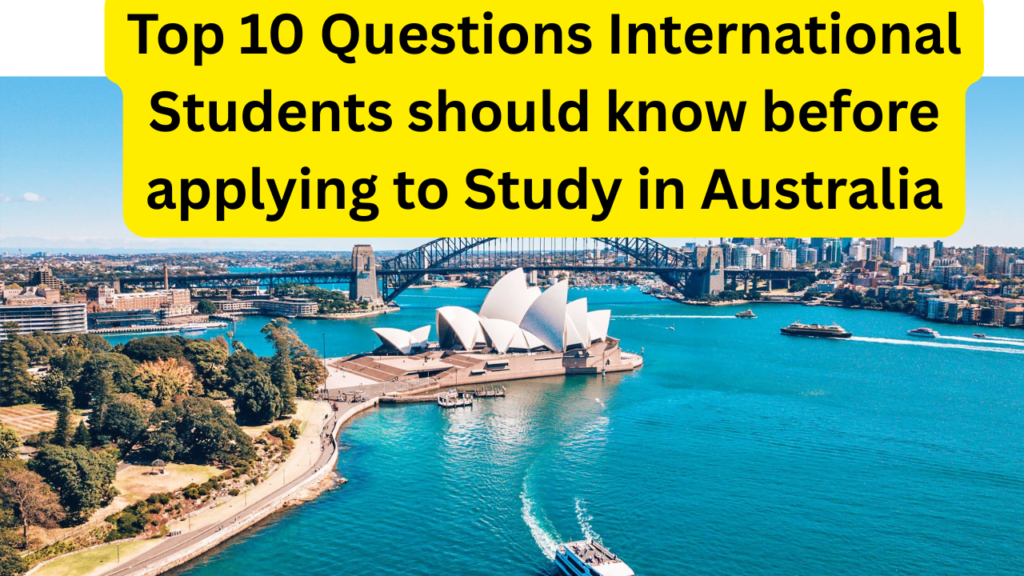Are you planning to study in Australia but have many unanswered questions? Many worldwide college students feel the same manner. Studying out of the country is an existence changing selection and collecting accurate data is important.
At Global Unity Education & Career Services, we assist students with university selection, visa applications and everything in between. The top 10 questions and answers that international students should know are:
1. What Documents Do I Need to Study in Australia?
The documents that are needed to apply for an Australian student visa (Subclass 500) are:
- Valid Passport (minimum six months validity)
- Confirmation of Enrolment (CoE)
- Academic Transcripts and Certificates
- Statement of Purpose (SOP)
- English Proficiency Test Scores (IELTS, PTE)
- Proof of Financial Support (bank statements, sponsor details)
- Overseas Student Health Cover (OSHC)
- Genuine Student (GS) Statement
Tip: Check all visa and university specific requirements before applying.
2. Why Should I Choose Australia for Higher Education?
You should choose Australia for higher Education due to:
- Globally Recognized Universities: 7 Australian universities rank in the world’s top 100.
- Post Study Work Opportunities: Graduates can apply for a Temporary Graduate Visa (Subclass 485).
- High Quality Education System: Emphasis on research and practical learning.
- Student Friendly Policies: Work up to 48 hours per fortnight during studies.
- Pathway to PR: Many courses align with Australia’s skilled occupation list.
Tip: Choose a course that fits your career goals and PR prospects.
3. When Should I Apply for Admission in Australia?
You should apply Australian universities in two major intakes:
- February/March Intake: Apply by September to November (previous year).
- July Intake: Apply by January to March (same year).
- Some universities also offer a November intake for selected courses.
Tip: Apply early to secure scholarships and accommodation.
4. What Tests Do I Need to Take for Studying in Australia?
Most universities require an English proficiency test:
- IELTS: Minimum score: 6.0 – 7.0 (varies by course/university).
- PTE Academic: Minimum score: 50 – 65.
- TOEFL iBT: Minimum score: 60 – 100.
- For MBA or specialized programs, universities may also require GMAT or GRE.
Tip: Check the university’s official requirements before booking your test.
5. How Much Does It Cost to Study in Australia?
The total cost includes tuition fees, living expenses, and additional costs:
- Tuition Fees: AUD 20,000 – 50,000 per year.
- Living Expenses: AUD $29,710 per year (minimum required for visa).
- Health Insurance (OSHC): AUD 600 – 1,500 per year.
- Other Costs: Travel, books and personal expenses.
Tip: Scholarships and part time jobs can help manage expenses.
6. What Are the Accommodation Options for International Students?
The accommodation options you can choose from:
- On campus accommodation: Convenient but may be expensive.
- Off campus rentals: More independence, costs vary by city.
- Homestays: Living with a local family for cultural experience.
Tip: Check university accommodation options and rental market trends.
7. What Are the Work Rights for International Students in Australia?
The work right with a Subclass 500 Student Visa, you can:
- Work 48 hours per fortnight during studies.
- Work full-time during semester breaks.
- Apply for Post Study Work Visa (Subclass 485) after graduation.
Tip: Many students work in hospitality, retail or internships related to their field.
8. How Do I Choose the Right University and Course?
You should consider the following factors:
- University Rankings and Accreditation
- Course Content and Career Prospects
- Location and Cost of Living
- PR Pathway Courses (Engineering, IT, Nursing etc.)
Tip: Speak to education consultants for personalized recommendations.
9. What Are the Common Challenges of Studying in Australia?
Moving to a new country can be overwhelming. The common challenges include:
- Culture shock: Adjusting to new lifestyles and environments.
- Homesickness: Missing family and friends.
- Financial stress: Managing tuition and living costs.
- Language barriers: Understanding the Australian accent and slang.
Tip: Join student groups and seek support from university services.
10. Can Studying in Australia Help Me Get PR (Permanent Residency)?
Yes, Australia offers PR pathways for international graduates. They are:
- Temporary Graduate Visa (Subclass 485): Work in Australia after graduation.
- Skilled Migration Pathway: Occupation based PR (Subclass 189, 190, 491).
- Employer Sponsorship: Get PR through employer sponsored visas.
Tip: Choose courses in demand, such as IT, Nursing, Engineering or Teaching.
Start Your Australian Journey with Global Unity Education and Career Services
At Global Unity Education and Career Services, we don’t just help you study abroad—we help you succeed! Our education consultancy services in Australia ensure a smooth experience, from university selection to settling in your new home.
Let’s make your Australian study dream a reality!





